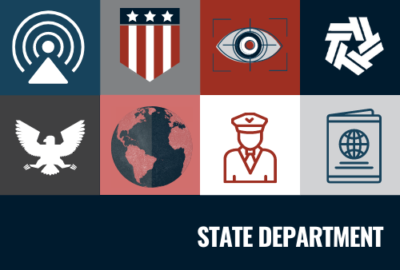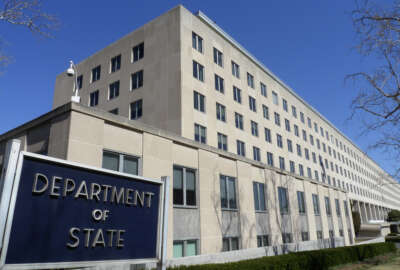

The State Department’s Foreign Service is recruiting a new generation of its IT workforce, and training them to support its diplomatic mission at posts across the...
The State Department’s Foreign Service is recruiting a new generation of its IT workforce, and training them to support its diplomatic mission at posts across the globe.
The department launched the Foreign Affairs Information Technology (FAIT) Fellowship as a pilot program in 2017, modeled after its Pickering and Rangel fellowships.
Six years later, the FAIT fellowship is coming into focus as one of the agency’s high-profile diversity recruitment programs.
In its first year, the fellowship accepted five fellows but has since expanded to 15 fellows.
The FAIT Fellowship is focused on building a pipeline of in-demand IT experts into the Foreign Service, as well as diversifying its ranks.
The program seeks to address several longstanding State Department workforce challenges highlighted by the Government Accountability Office.
The Government Office reported in recent years that racial and ethnic minorities make up 32% of the State Department’s workforce in 2018 — up from 28% in 2002.
But GAO found that diversity has not filtered up to the agency’s higher ranks.
The watchdog office also another report last year calling on the State Department to step up its efforts to recruit and retain IT workers.
The fellowship program works with the department’s Bureau of Information Resource Management to select fellows, along with the Washington Center, a nonprofit organization that supports the fellowship through grants.
Taylor Rainey, a graduate fellow from Howard University, said in a 2021 interview that she found out about the FAIT fellowship through her undergraduate advisor.
In a follow-up interview earlier this month, Rainey, now stationed in Brussels, said the fellowship gives her an opportunity to apply the IT skills she’s learned.
“This is what I’ve been planning and practicing for, getting to work and applying what you know,” Rainey said. “It’s working with brilliant people, and it’s getting the opportunities and chances to showcase your talent,” Rainey said.
Rainey said some of her duties, on any given day, include changing and organizing servers, cutting cables and rearranging rooms to improve the strength and reach of the embassy’s Wi-Fi.
Rainey will complete her summer internship in Brussels in August, and will return to D.C. to receive training at the State Department’s Foreign Service Institute.
After completing her degree and graduating next year, she’ll embark on her first overseas post as a full-time information resources specialist.
As she advances in her Foreign Service career, Rainey said she’s focused on making an increasingly digital world more equitable for underrepresented communities.
“There are certain classes of people who are being left behind, due to the rate of technical advancements in our world,” she said.
Part of the work includes bridging the “digital divide” for vulnerable populations, including the elderly, formerly incarcerated individuals and immigrants.
Rainey said she’s reaching out to students at historically black colleges and universities to spread awareness of Foreign Service careers.
“I’m here opening doors and holding the door open for others because I know, people held doors open for me,” she said.
Mia Bennett started her career in the Foreign Service in fall 2022 as an information management specialist, after completing the FAIT fellowship.
Bennett, now stationed in Manila, said the FAIT fellowship appealed to technical skills and prior experiences studying abroad in South Korea, Australia and Finland.
Bennett graduated from the University of Maryland with a degree in computer science, with minors in Korean and Japanese. She said she was interested in applying to become a Foreign Service officer before learning about the FAIT fellowship.
“When I saw that the Foreign Service actually had more positions than just the front-facing generalist side of things, I was really curious and intrigued to know if I could do the same thing, because I thought it was a good combination of my personal and professional interests,” Bennett said.
Bennett said her IT work supports not just the Foreign Service, but other federal agencies operating out of the U.S. Embassy in Manila.
“Because it’s such a large post, I can dip my toes in a lot of different projects that are going on,” she said. “I’m learning a lot every single day I’m interacting, I’m meeting new people. And so from a work perspective, I think it’s really cool the work that I’m doing. And I can’t imagine doing any other job right now.”
Bennett last month went on a temporary duty assignment last month to help the State Department lay the groundwork for President Joe Biden’s trip there — which he postponed, to focus on debt ceiling negotiations.
Bennett said the FAIT fellowship recruits a wide range of people from all different backgrounds, which helps the department bring in new perspectives and ideas.
“It’s good that the department’s modernizing its IT infrastructure, but at the same time, it’s modernizing its workforce and the people and how they hire,” she said.
Sara Robinson Camarena, a University of Arizona graduate, completed the FAIT Fellowship and joined the Foreign Service full-time in January.
Camarena is currently stationed in the D.C.-area and studying at the Foreign Service before embarking on her first overseas post in Libreville, Gabon.
“Being able to join the Foreign Service means I get to give back,” Camarena said, adding that she’s participated in several Hispanic Association of Colleges and Universities events to promote opportunities to join the Foreign Service.
Camarena said the FAIT fellowship and her experience in the Foreign Service has given her an opportunity to learn from mentors in her field.
“All of my mentors so far are women, and I just have like all of these great women to look up to and learn from. They’re all from different cultures, and I can just learn so much from them [and] the way they look at the world,” Camarena said.
Copyright © 2025 Federal News Network. All rights reserved. This website is not intended for users located within the European Economic Area.
Jory Heckman is a reporter at Federal News Network covering U.S. Postal Service, IRS, big data and technology issues.
Follow @jheckmanWFED


